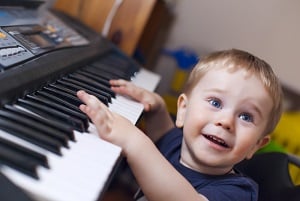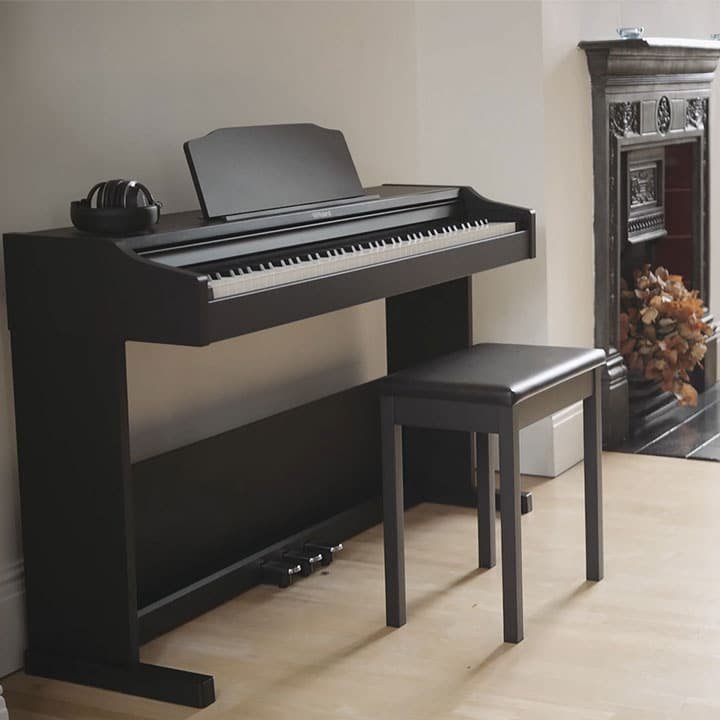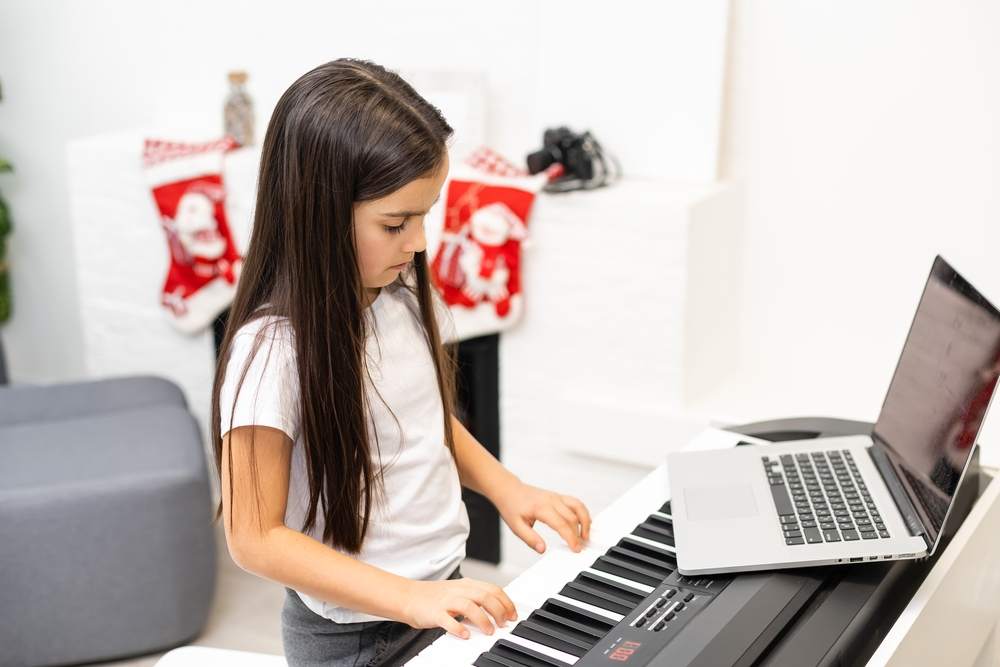Digital pianos offer a practical alternative to acoustic pianos, providing portability and affordability. They accurately simulate the sound and feel of traditional pianos.
Digital pianos have become increasingly favored by musicians at all levels, from beginners to professionals. These instruments serve as an excellent option for those who have limited space or are seeking a less expensive and maintenance-free alternative to the classic acoustic piano.
With advanced sampling technology, digital pianos replicate the rich tones and nuanced sound of their acoustic counterparts. Many models also feature weighted keys to mimic the authentic touch response of a traditional piano. This versatility makes digital pianos suitable for practice, performance, and music education. Additionally, features like headphone connectivity, built-in metronomes, and a variety of sounds make them a versatile tool for composers and performers alike. For anyone wanting to enjoy piano playing without the constraints of size and tuning, digital pianos are a sound choice.
The Rise Of Digital Pianos
The world of music continues to evolve as technology advances. Pianists now often turn to digital pianos as a convenient and flexible option for playing and learning.
A Brief History
In the 1950s, digital pianos began to emerge. Early versions were simple electric models. By the 1980s, technological breakthroughs allowed for more sophisticated instruments. These keyboards could mimic the sounds of a grand piano. They became widely popular among musicians.
- 1950s: The birth of electric pianos.
- 1980s: Advancements in sound quality.
- Modern Era: High-tech features and realistic feel.
Popularity Surge In Modern Times
Digital pianos have become a staple for many. They offer a mix of convenience, portability, and cost-effectiveness. Teachers recommend them for students. Professional musicians use them for practice and performance. Home-enthusiasts enjoy their compact size and headphone options.
| Feature | Benefit |
|---|---|
| Portability | Easy to move and transport. |
| Headphone Jack | Private practice without disturbing others. |
| Variety of Sounds | Access to numerous instrument voices. |
| MIDI Compatibility | Connectivity for recording and music production. |
Digital pianos reflect an era where tradition meets innovation. Their popularity continues to soar among all ages and skill levels.
Comparing Acoustics And Electrics
Welcome to the world of pianos, where the debate between acoustic and electric models remains lively. From classic grand pianos to modern digital keyboards, each instrument type presents unique features for musicians of all levels. Let’s explore key differences between them, focusing especially on sound quality and tactile response.
Sound Quality Variations
Digital pianos offer a range of sound options, from mimicking grand piano tones to various other instrument sounds. With advanced sampling technology, these pianos deliver rich and dynamic audio experiences. Acoustic pianos, known for their natural, warm tones, resonate with vibrating strings and a wooden soundboard. Digital pianos need electronics to produce sound, while acoustic pianos rely on physical components.
Tactile Response Differences
When pressing a key on an acoustic piano, you feel a mechanical action. This action connects directly to hammers hitting the strings. Digital pianos use weighted keys to simulate this, but the sensation may vary. Some digital models come close to emulating the heft and rebound of acoustic keys. Others might feel lighter or less responsive. For players seeking an authentic touch, it’s important to try different keyboard actions to find one that best emulates the acoustic feel.
- Acoustic pianos: Hammer and string action for a real feel
- Digital pianos: Weighted keys to mimic acoustic response
Advantages Of Digital Pianos
An exploration into the Advantages of Digital Pianos sheds light on why these modern instruments are trending. From their multifaceted functions to the ease of care, digital pianos stand out as a great choice for both beginners and seasoned pianists. Let’s delve into some of their key benefits.
Versatility And Features
Digital pianos offer a wealth of features that acoustic pianos don’t. With a digital piano, musicians enjoy:
- Variety of sounds: Hundreds of tones, from grand piano to strings, are available at the touch of a button.
- Built-in metronome: This helps players keep time, vital for practice.
- Recording capabilities: Users can record and playback their performance, a handy tool for improvement.
- Headphone jack: Practice at any time without disturbing others.
Convenience For Learning And Practice
For those starting their musical journey, digital pianos serve as excellent learning tools. They simplify the learning process with features like:
- Weighted keys: Replicate the feel of an acoustic piano, aiding in finger strength development.
- Lesson modes: Split keyboards allow teachers and students to play side by side.
- Connection to apps: Interactive learning with educational software elevates the experience.
Maintenance And Durability
Digital pianos boast remarkable durability and are nearly maintenance-free. Highlights include:
- No tuning required: Stay in perfect pitch without the need for regular tuning.
- Resistance to climate: Unaffected by humidity and temperature changes, unlike acoustic pianos.
- Portable build: Most models are lighter and easier to move.

Credit: joshuarosspiano.com
Limitations To Consider
Before choosing a digital piano, be aware of some limitations. These factors might affect your satisfaction and the piano’s value over time.
Authenticity Of Experience
Digital pianos try to mimic grand pianos, but there are differences. The feel of the keys and the sound quality can be a giveaway. For professional pianists, these differences are critical. Even with advanced technology, the following points highlight distinctions:
- Touch sensitivity: Unlike acoustic pianos, the response might lack nuance.
- Pedal function: The sustain and expression might not fully replicate an acoustic piano.
- Sound decay: Digital sounds can be abrupt or unrealistic during longer notes.
Resale Value And Longevity
Digital pianos do not hold their value as well as acoustic pianos. Technology advances quickly, and newer models often outshine older ones. This quick obsolescence impacts resale value. Consider the following:
| Aspect | Impact |
|---|---|
| Technology | Outdated features lower the price. |
| Wear and Tear | Electronics can degrade faster than acoustic components. |
| Brand | Popular brands may retain value longer. |
Longevity is also a concern. Acoustic pianos can last for decades with proper care. Digital pianos may require repairs or replacement parts, which could be costly or difficult to find as the model ages. Digital piano owners should prepare for potential additional expenses down the line.
Selecting The Right Digital Piano
Thinking about buying a digital piano? Great choice! Digital pianos offer an amazing mix of sound, features, and convenience. But with so many options available, picking the perfect one might feel overwhelming. Don’t worry. This guide helps you find the ideal digital piano to match your music dreams!
Key Considerations
What should you look for in a digital piano? Here are the must-check factors:
- Sound Quality: The piano should have clear, rich sounds that mimic an acoustic piano well.
- Touch Response: Keys should feel natural and responsive, like a real piano.
- Polyphony: Higher polyphony allows you to play more complex music without note drop-offs.
- Features: Consider built-in metronomes, recording capabilities, and connectivity options.
- Size: Make sure the piano fits your space and is easy to move if needed.
- Budget: Find a good balance between quality and what you can afford.
Popular Brands And Models
Digital pianos come from many brands, each with standout models. Take a peek at these leaders:
| Brand | Model | Highlights |
|---|---|---|
| Yamaha | P-125 | Authentic feel, excellent sound quality, portable |
| Casio | Privia PX-160 | Affordable, weighted keys, realistic sounds |
| Roland | FP-30 | Wide sound range, Bluetooth compatibility, durable |
| Kawai | ES110 | Responsive hammer action, built-in lessons, lightweight |
Try out different models to see which piano’s touch and tone feel right. Listen to the sound through headphones and speakers, as this can change your playing experience. Remember, the best digital piano for you is the one that meets your specific needs and inspires you to play every day!

Credit: rolandindonesia.com
Expert And User Experiences
The discussion on whether digital pianos can deliver a gratifying playing experience often leads to contrasting opinions. Examining the experiences can unlock insights into the suitability of these instruments. Let us delve into what professionals and casual players are saying about digital pianos.
Professional Musicians’ Takes
Professional musicians often seek instruments that provide outstanding sound quality and expressiveness. Many have embraced digital pianos for their consistent performance and advanced features. Some highlights include:
- Touch Sensitivity: Professionals appreciate keys that react like an acoustic piano.
- Sound Range: Built-in sounds offer versatility for different music genres.
- Portability: Easy to transport to gigs without compromising on sound.
| Feature | Benefit |
|---|---|
| Record Function | Enables musicians to capture their performances. |
| Headphone Jack | Allows for silent practice sessions. |
Feedback From Hobbyists And Learners
Hobbyists and learners find digital pianos particularly appealing. Important factors for them include:
- Ease of Use: Beginners value straightforward controls and interfaces.
- Learning Tools: Integrated features help with practice and skill development.
- Affordability: Digital pianos offer a budget-friendly start to learning.
User feedback often highlights the importance of a realistic piano feel. Learners note that weighted keys aid in developing proper technique. With numerous voices and rhythms available, they experiment without feeling limited by their instrument.

Credit: lessonsinyourhome.net
Can the Portability of Digital Pianos Affect Their Quality?
Yes, digital pianos are portable, but that doesn’t necessarily mean it affects their quality. Many high-quality digital pianos are designed to be portable without compromising on sound and key action. However, some extremely lightweight and compact models may sacrifice certain features to prioritize portability.
Frequently Asked Questions Of Are Digital Pianos Good
What Are The Disadvantages Of Digital Piano?
Digital pianos often lack the nuanced touch response of acoustic pianos. Their sound quality can be inferior, with less resonant and authentic tones. Limited sound projection and the absence of physical string vibrations affect playability and expression. Maintenance updates and technology can become outdated.
Is It Ok To Learn Piano On A Digital Piano?
Yes, learning piano on a digital piano is completely acceptable. Digital pianos offer versatility and are suitable for beginners to advanced players. They provide a convenient, space-saving alternative with various features that mimic the acoustic piano experience.
Which Piano Is Better Digital Or Acoustic?
The choice between digital and acoustic pianos depends on your needs. Acoustic pianos offer rich sound and traditional feel but require maintenance and space. Digital pianos are versatile, portable, and often more affordable, with headphone options for silent practice. Consider your priorities for the best fit.
Are Digital Pianos As Good As Upright?
Digital pianos offer practical benefits over uprights, such as volume control and portability, but may lack the nuanced touch and tone of traditional upright pianos.
Conclusion
Navigating the nuanced realm of digital pianos reveals a trove of benefits for musicians of all levels. These instruments offer versatility, convenience, and cost-effectiveness, melding the timeless with the technological. Whether pursuing a passion or honing skills, a digital piano can be a sound investment in your musical journey.
Let the music play on, with keys that cater to the modern maestro.
